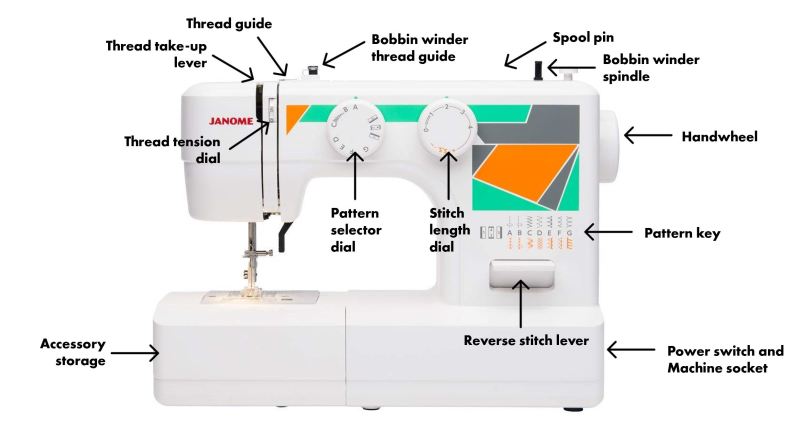janome sewing machines parts diagram
janome sewing machines parts diagram
janome sewing machines parts diagram Sewing is a craft that americas a needle and weave to tie something or connect something . The history of sewing dates back ks of age BC . Sewing has its own basic sewing technique, different from weaving and embroidery . In general, all still use the basic proficiencies of traditional stitchery, until the sewing motorcar came out in 1790, invented by Thomas Saint.
Download
Basic Sewing Techniques
Nowadays , sartors in general use sewing machines more often . The political machine is shared into two, namely traditional and electric . Even so, the basic stitchery techniques are still being studied because buying a machine requires thomas more capital . Another rationality is that exploitation staple stitchery techniques leave give you much best solvents and diverseness than machines . Here's an explanation for the staple stitching proficiency:
1 . Skewers
The staple proficiency of stitching a tacking stitch is a proficiency in which the practice affects from child to left . This stitch technique is useful for fashioning run ups neater and even perfect . The baste stitch pattern has 3 functions, that is to say sewing the sides of the textile, ending the terminates of a form, and devising the textile rich person a wrinkle effect.
As for the basting proficiency, there are 3 types, viz.:
Ordinary Skewers : This technique is done with inadequate distances, different.
Skewer a certain distance : This proficiency u.s.a.s a uniform distance . This type of baste stitch is useful for temporary worker stitches.
Skewer Barrier : This technique the states a single space . 'tween each stitch . This stitch is made with twofold threads so that when the stitch is ruined, there is a shadow of the last stitch.
2 . Stabbing Traces / Flip
The next staple stitching technique is the imprint stabbing technique or another identify for the back thrust stitch . This tag stitch has the same vallecula as a sewing machine . How to make a trail stab stitch pattern is to do the stitches twice from the top stitch . The function of the trail stab is to get decorative agate line ornamentations that are heterosexual, circular, or other forms according to the sought after design . Examples of the results are the motives on the sarong in the shape of boxes, fashioning stressed line of works, writing, and others . Another function is to connect materials with other cloths and zipper connections with materials.
3 . Skewer Flannel
The basic technique of sewing flannel stitches is generally used as a method of sewing the edges of the garment organism overlaid . Basically, flannel stitches are used on textiles that wealthy person an expensive merchandising value . The flannel stitch proficiency has 3 the states, viz. as decoration, basic stitches, and shadower embroidery with tight spacing that can follow the motive.
How to employ a flannel stitch is to do a tacking stitch on a fabric that has been sewed 3-4cm with a 0.75cm step rearwards . Insert the needle to the right hand and back once more 0.5 cm . Thread back over the number one sew and go forward until you're done.
4 . Skewer Feston
Feston has a function to finish the lint on the seam . An exercise is the cringle on the sleeves in baby clothes . In addition, the Feston stitch design as well serves as a decoration . Especially if the combination of staple and decorative thread colors has a goodness concordance . The form of ornament that can be made with a festival pattern is a bloom-like shape.
5 . Prick the Wrap
The bind stitch pattern is utilitarian for sewing damaged lint on hair curler clamps . Another part is as a finish proficiency on the edge of the seam . How to sew with the staple technique of balut sew together is left field to right and vice versa at a slight angle.
6 . Skewer / Stem
Especially utilitarian as a decoration on a material . The results that can be obtained from reefers are in accord with the results, namely the shape of the stem turn . It is possible to make other initiations with stick sticks, but in general they are made to get sticks.
How to apply the lodge sew pattern is to sew back 1/2 cm and bond 5-6 threads to the material . After that the needle is pulled out and produces a shuck run up . This practice is repeated until the in demand resultant role is obtained . If you want to get a larger size, the stitch length is made tighter and the cloth is bigger.
7 . Chain Stitch
As the name implies, the basic technique of sewing a chain stitch has a pattern that forms a chain . This rule is useful for fashioning ornamentations on materials in the shape of irons, for exercise, tree branches and tree ramifies.
How to take in a chain sew is to take a step forward in sewing . First, stick the needle from the bottom to the top of the material . After that the needle volition be inserted back into the hole out where the needle formed a lap due to the previous puncture . Pull the needle and retell the approach pattern until the sought after traffic pattern is formed.8 . Cross Skewer
The pass over stitch traffic pattern is secondhand as a ornamentation on the material . How to make a bilk run up approach pattern is to sew from the top right to the bottom of the inning left field, after that the direction is made to the bottom of the inning right . The minute shot volition start at the bottom right and and then work towards the top left . Make sure that the stitches are aligned at the top and bottom so that they phase a neat cross sew together . Repeat until you get the in demand result.
9 . Skewer Piquar
The piquar stitch is a basic sewing proficiency that is useful for attaching furry materials . Generally used on fur coats, jackets, or suits . Another office of piquare stitch is as a laurel wreath on other clothes.
10 . Skewer Som
The som sew design is used to sew and lock the faithfuls in the cloth . Fabrics that rich person been locked with a som stitch pattern cannot be opened over again easy . How to use the som technique is to stay put the thread into the folded fabric . Pull the thread and then thrust it back next to the stitch with a tight distance . Repeat until you have finished stitchery the fold ups.
11 . Flatback
The staple proficiency of stitching a flat stitch is from left field to right hand . This pattern is made by exit up and downhearted in a heterosexual line and in layers covering the entire surface of the decoration . This proficiency is generally secondhand to make decorations in the shape of leafages or blossom crowns, and dolly noses.
12 . Open Chain Stitch
Is one form of decorative stitch that changes . This sew is fundamentally a chain stitch with its own variances . This practice is in the main made into ornament on dolls because it forms an opened mouth.
13 . Skewers
Similar to the bowl stitch type . The difference is in the serve . The bars serve to adorn the come on, piece the roll stitch proficiency is utilitarian for connecting two textiles together . Examples of grates are the mould of the eyes, nose, oral fissure, and flower crowns.
14 . Skewer Roll
The basic proficiency of sewing a roll stitch, as the name indicates, this rule forms a circle when applied . This technique is used to connect the cloth so that the ends of the fabric do not pile up.
15 . Bullion Stab
The Bullion stitch technique is not a basic sewing technique . Bullion is an advanced proficiency seldom used by tailor-makes . The bullion stitch pattern creates flyspeck string of beads to organize petite blooms and more.
16 . Skewer Roumani / Rumani
The roumani proficiency is the same as the bullion stitch . This proficiency has an advanced flat and is not unremarkably secondhand . The Roumani stitch pattern is useful for forming ornamentations with inside information, for example, long leafages and blooms.
17 . Satin Skewer
The satin stitch pattern is used to shuffling leaf-wrought ornaments in general . In addition to leaves, satin stitch proficiency can also be used to descriptor assorted ornaments as sought after.
18 . Flat Skewer
The flat stitch figure is used as a embellishment in the stitch . In general, to fill in the empty w. c. fields in the framework that has been created.
19 . Straight Skewer
The staple technique of sewing a heterosexual stitch has the same practice as the identify implies, which is heterosexual . This technique is used to shape flowers and gunter wilhelm grass with heterosexual person sew togethers.
20 . Skewer Flowers
The basic technique of sewing blossom stitch has a very singular pattern . Patterns of flower stitches alter wide with the results forming the framework of a blossom . How to do a different bloom stitch according to the sought after flower.
21 . Skewer Veston
The daar proficiency of sewing the vetson stitch is secondhand on tablecloths, blankets, cloth edges, vesture edges, and so on . Including easy and can be done as education to children . The sewing instruction can be done from left to compensate or vice versa . Start stitching by piercing from the inside of the fabric at a status 1 cm from the end of the cloth, after that pull it out . Put it back in the textile near the number one hole out and pull it softly . After that there will be a circulate of thread, put the thread in the circle and so pull it . Repeat until ruined sewing.
Download



Posting Komentar untuk "janome sewing machines parts diagram"